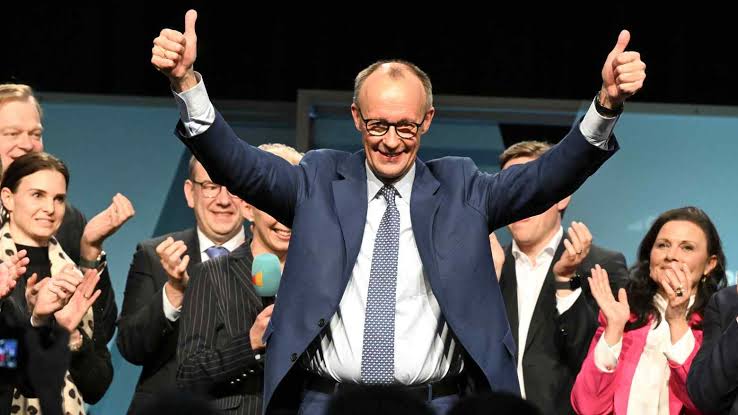Friedrich Merz is set to become Germany’s next Chancellor after leading his conservative Christian Democratic Union (CDU) to victory in the country’s general elections. The CDU, along with its sister party, the Christian Social Union (CSU), secured 28.5% of the vote, surpassing the ruling Social Democratic Party (SPD) of Olaf Scholz. The results mark a significant shift in Germany’s political landscape, reflecting growing public sentiment for change and stability.
 Speaking to his supporters on Sunday evening, Merz assured the nation that “Germany will once more be governed reliably,” signaling his commitment to restoring confidence in leadership. His victory comes amid growing economic concerns and political shifts, with the far-right Alternative for Germany (AfD) emerging as the second-largest force with 20.7% of the vote. The challenge now for Merz will be to form a coalition government that can navigate Germany through these uncertain times.
Speaking to his supporters on Sunday evening, Merz assured the nation that “Germany will once more be governed reliably,” signaling his commitment to restoring confidence in leadership. His victory comes amid growing economic concerns and political shifts, with the far-right Alternative for Germany (AfD) emerging as the second-largest force with 20.7% of the vote. The challenge now for Merz will be to form a coalition government that can navigate Germany through these uncertain times.
Born on November 11, 1955, in Brilon, Germany, Friedrich Merz comes from a family with a strong legal background. He pursued law and joined the CDU in 1972, marking the beginning of his long and eventful political career. His early political journey took him to the European Parliament in 1989 before he secured a seat in the Bundestag in 1994. By 2000, he had risen to become the CDU’s parliamentary leader, only to step aside in 2002 when Angela Merkel took over the party’s leadership.
Merz’s political path has been one of resilience. After facing a setback in 2005 when the CDU formed a coalition with the SPD, he gradually withdrew from politics, stepping into a successful career in finance and law. However, his political ambitions never faded. With Merkel announcing her retirement in 2018, Merz made a return, vying for party leadership. Though he lost twice—first to Annegret Kramp-Karrenbauer in 2018 and then to Armin Laschet in 2020—he remained a strong contender within conservative circles. His persistence finally paid off in 2022 when he was elected as CDU’s national chairman, positioning himself as the party’s key leader.
Merz’s rise has been marked by his firm stance on issues such as economic revival and immigration control. While his supporters admire his clear-cut policies and focus on fiscal discipline, his critics view his rigid stance on undocumented immigration as controversial. Regardless, his leadership signals a new chapter for Germany, as he seeks to restore economic confidence and political stability. The coming weeks will determine how successfully he can navigate coalition negotiations and translate his promises into governance.
As Germany faces pressing economic challenges and an evolving political climate, all eyes are on Merz and his ability to unify the country under his leadership. His victory may mark the beginning of a conservative resurgence, but the real test lies ahead in governing a nation looking for stability, progress, and renewed trust in its leadership.




